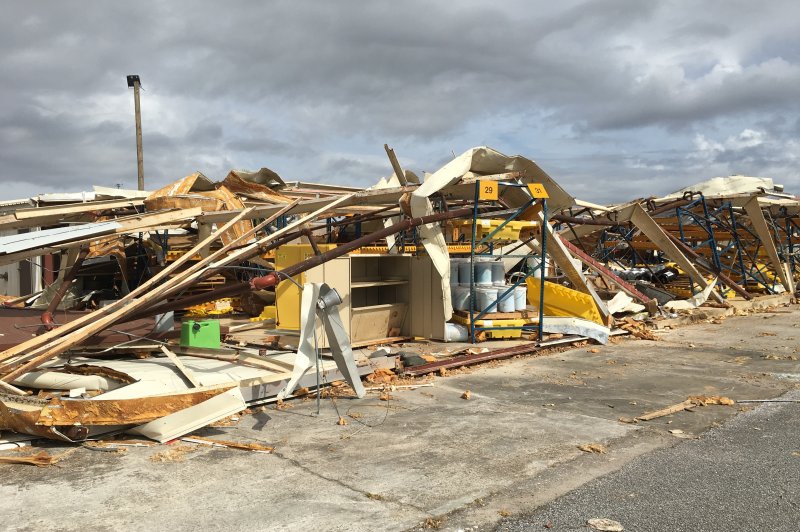Two members of a House Armed Services subcommittee charged on Wednesday that the Pentagon is unprepared for weather emergencies, such as the hurricane that struck Tyndall AFB, Fla., in 2018, as well as cyberthreats. Photo courtesy of U.S. Department of Defense
Oct. 18 (UPI) -- The Pentagon is unaware of the scope of environmental and cyber threats to its military bases, members of the House Armed Services Committee charged.
Rep. James Langevin, D-R.I., chair of the intelligence, emerging threats and capabilities subcommittee, at a hearing this week cited four U.S. military bases which collectively sustained over $10 billion in damage from weather events.
He referred to Marine Corps Base Camp Lejeune, N.C., and Tyndall AFB, Fla., overwhelmed by hurricanes last year; the flooding of Offutt AFB, Neb., by overflowing rivers; and earthquakes in July 2019 which damaged China Lake Naval Weapons Station, Calif.
The hearing on Wednesday came after the subcommittee requested an assessment by the Defense Department of its risk exposure to weather events and cyberattacks.
"I must say I have been disappointed in the department's response to our oversight," Langevin said in an opening statement. "The [Pentagon's] initial accounting of at-risk bases we received did not include Camp Lejeune or Tyndall Air Force Base at all. We need a clear accounting of the risks, with dollar figures attached, or else we will continue the cycle of throwing good money after bad, which is not only fiscally irresponsible but places our service members and readiness at risk."
In testimony, Robert McMahon, the assistant secretary of defense for sustainment, agreed that building standards on military bases need to be improved, but added that he is unaware of the costs involved.
Langevin asked McMahon, "Do you feel you have an adequate understanding of the dollars and cents involved?"
McMahon responded, "I don't," added that he has asked each service branch to submit financial estimates of potential damage to military facilities.
The Pentagon has said it has over 500 installations worldwide, and over 500,000 buildings, valued at over $1 trillion.
In her opening statement at the hearing, Rep. Elise Stefanik, D-N.Y., said the military is unprepared for emergencies.
"First, we remain vulnerable to extreme weather events and climate change," she said. "We must therefore factor in these environmental changes when discussing resiliency of military installations."
Stefanik also noted a 2017 Congressional directive, asking the Defense Department to assess the digital threat to military bases and begin strengthening their defenses.
"We are still incredibly vulnerable to attack," she said. "I fear we have not yet identified the scale and scope of our problems, let alone begun to mitigate our most concerning shortfalls."















